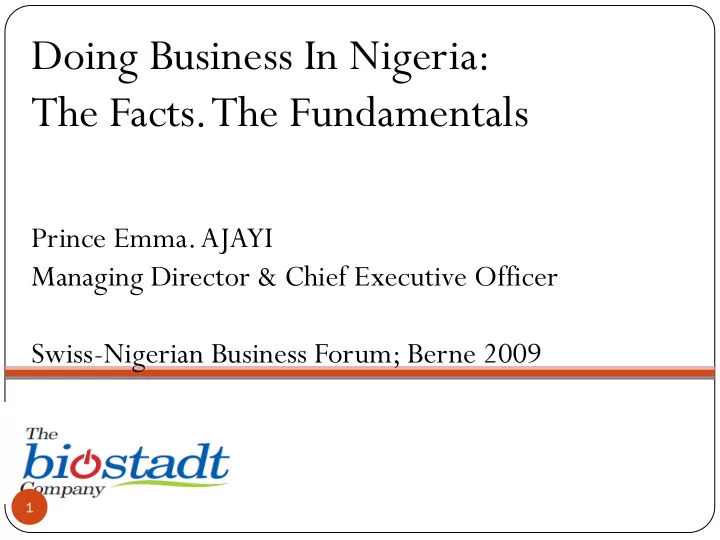

Doing Business In Nigeria: The Facts. The Fundamentals Prince Emma. AJAYI Managing Director & Chief Executive Officer Swiss-Nigerian Business Forum; Berne 2009 1
2
Fact 1: Market Environment • Population: 140 mio • Population Growth rate: 3% • GDP: 6 – 9% • External reserve: Enough to cover 2 years imports at current levels • Domestic Economy: Strong & Virile; Private-Sector led • Human Capital: Dynamic, Available, Employable & Qualified Professionals • Geographic Positioning: Serves as gateway to West Africa market • Inherent Ability to resolve internal problems • Resilient Economy 3
Fact 2: Market Environment Positive Government Attitude to Private Sector Businesses One Stop Investment Centre created at NIPC Beneficial Tax Incentives: - Zero Tax on Profits accruing from Export of Goods - 10% Investment Allowance on CAPEX - R & D Tax Relief - Pioneer Status Tax exemption No restriction of Ownership Or Shares Transfer (Free Entry & Free Exit) Ease of Capital repatriation Abundant Investments Opportunities 4
Fact 3: Market Environment SEQUENTIAL 5 – YEAR GDP GROWTH RATE Year Growth Rate 2008 7.9 2009 10 2010 15 2011 18 2012 16 Source: National Planning Commission 5
Fact 4: Market Environment VISION 20: 2020 – The New Economic Platform. The Synopsis: - Adoption of Appropriate Macro-Economic Policies - Stimulating the Manufacturing Sector & Strengthening its linkage to . Agricultural sector - Massive Investments in Infrastructure & Human Capital & Creating an Enabling Environment for domestic and private investment - Raising the relative competitiveness of the real sectors - Achieving double digit growth rates and economic diversification Source: National Planning Commission 6
Fact 5: Market Environment Government Policy Thrusts: These border on 4 Key Areas FISCAL POLICY THRUSTS: PUBLIC DEBT POLICY THRUSTS: Institutionalizing fiscal prudence in line In line with Fiscal Responsibility Act of . with provisions of Fiscal Responsibility 2007, contracting external borrowing will Act of 2007 only be from concessional windows or tied to productive and self-financing projects MONETARY POLICY THRUSTS: EXTERNAL SECTOR POLICY THRUSTS : Monetization of foreign exchange receipts from Value added production to make manufacturing oil exports & sustenance of liberalized foreign sector a major driver of growth and exports exchange market 7
Fact 6: Investment Opportunities - General Oil & Gas (Crude Oil Refining, Transportation & Storage) Production of Liquefied Natural Gas Manufacture of Gas Cylinders, Valves & Burners Processing Plant for Refined Mineral Oils, Jelly and Grease Chemical Industries Fertilizer Plants Petrochemical Plants Rubber & Plastics Industries Food Processing & Preservation Trawling Fish & Shrimps Large Scale Integrated Farming Fruits Processing Manufacture of Agricultural Inputs – Chemicals etc 8
Fact 7: Investment Opportunities – Solid Minerals Nigeria has numerous minerals, including Limestone , Coal, Tantalite, Gypsum, Gold, Barite, Marble, Manganese Lead/Zinc, Bitumen, Tin/Columbite Iron Ore, Kaolin etc 9
Fact 8: Investment Opportunities – Energy & Telecommunications Generation, Transmission & Distribution of Electricity Local manufacturing of Electric Cables, Transformers , Porcelain & Other Electrical appliances, equipment & Component parts Telecommunication – Provision of private Network links, Sales & Installation of terminals, manufacture of telecom equipment and accessories, development of internet capacities etc 10
Fact 9: Opportunities through NEPAD NEPAD – New Partnership for Africa Development Comprehensive Program for Africa Development capturing Social, Political & Economic Elements that promotes investment into Africa Countries in the following major areas. Infrastructures, especially communication & Energy Agriculture Mining Manufacturing Tourism Fortunately, all are great business potential areas in Nigeria. 11
Fact 10: Strong & Buoyant Economy Strong & Dynamic Economy (+ policy) Resilient Economy (as the Old German Train) Growing Economy (double digit as from 2012) Second Biggest economy in Africa (after RSA) 12
The Fundamentals : MARKET STUDY -Set Up a proper Business Plan -Carry Out Due Diligence – Financial, Legal, Environmental -Check on Business & Sectoral Needs 13
The Fundamentals: ESTABLISH A PLAN Put an Action Plan in Place Work Your Plan – Deviations must be well defined 14
The Fundamentals: PARTNERSHIP The terrain requires people with deep knowledge of the local business environment . It brings about Quick Wins and build buffers around the young Investment while guaranteeing its future prosperity Note: Persons must be well investigated Like-Minded and Real Partners 15
The Fundamentals: Investment Scale Investors Must be Willing and Ready to invest on the long haul Scale of investment depends on several factors Short Term Contracts should never be the Guideposts Invest well, Invest Rightly, Invest for the future 16
The Fundamentals: Purpose, Vision & Mission Lucid, Strong & Compelling 17
The Fundamentals: People The Board The Management The Workers 18
The Fundamentals: Finance Long Term Or Short Term Off Shore Or Local Venture Capital Equity / Capital 19
The Importance of Doing Business in Nigeria 1. It contributes to its economy and thus able to play more roles in the sub-region and the African Continent as a whole 2. It will promote Regional and Global Health 3. Nigeria is a trigger for entry into other West African Markets 4. Nigeria needs Trade; Not Aids 20
The Conclusion Nigeria is a Gold mine S eize the opportunity to invest in the Country so as to strengthen the Trade Relations between both countries: Switzerland & Nigeria WELCOME TO NIGERIA 21
Recommend
More recommend